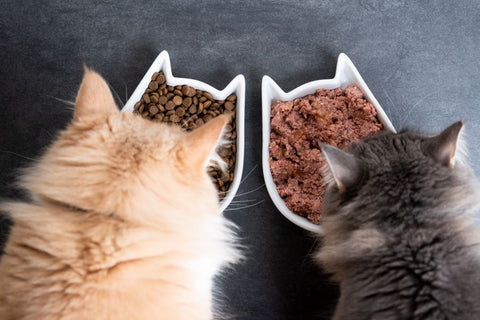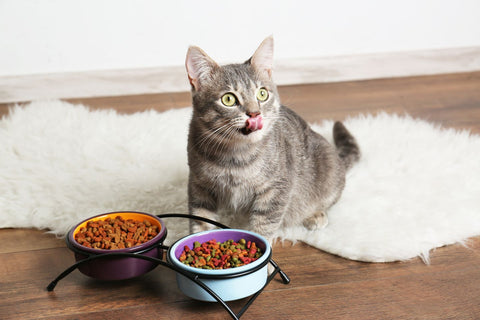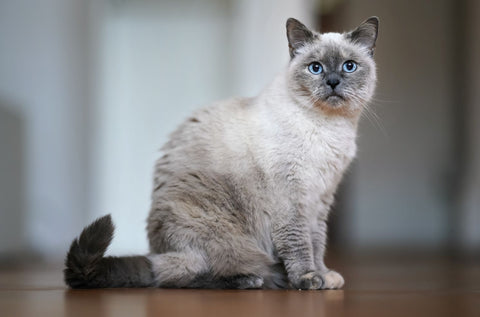

If you own a cat, you might know about probiotics and how they can be good for people. But do they also help cats? Probiotics are now a big thing in pet care, especially for better digestive health. A key question is—do probiotics actually aid cats? Let’s explore cat probiotics and see if these tiny bacteria can truly help.
What Are Probiotics?
Probiotics are live bacteria and yeast that are beneficial for health. They are very helpful for the digestive system. These good bacteria help balance the gut microbiome. This balance makes your cat’s digestive system work better. You can think of them as tiny helpers for your cat’s tummy. They help keep everything running smoothly.
Benefits of Probiotics for Cats: Digestion, Immunity
Probiotics can help our cats in several ways:
- Better Digestion: Probiotics help break down food and absorb nutrients. This is helpful for cats with sensitive stomachs or issues like diarrhea and constipation.
- Stronger Immune System: A healthy gut is key for a strong immune system. Probiotics can boost your cat's defenses against infections and illnesses.
- Less Stress-Related Symptoms: Cats can feel stress, which harms their digestive health. Probiotics help balance the gut microbiome and reduce stress effects.
- Help with Antibiotic Use: If your cat needs antibiotics, probiotics can bring back the good bacteria that antibiotics may destroy. This cuts down on side effects like diarrhea.
How Do Probiotics Work in Cats?
Probiotics are good for your cat. They add good bacteria to the gut. These beneficial bacteria fight harmful bacteria. This helps keep the gut healthy. A balanced gut microbiome is key for your cat's health. When the gut is balanced, your cat is less likely to feel digestive upset. This balance also makes their immune system work better to fight issues.
Do Probiotics Help Cats?
Probiotics can be helpful for cats. However, how effective they are depends on the type of bacteria and the individual cat. Things like the cat's age, breed, and size can change how probiotics work for them. Research on probiotics for cats is still developing. Many studies and personal experiences show that probiotics are good for their digestive health.
Not all probiotics are the same. You need to pick a probiotic that is made just for cats. A cat's digestive system is different from humans and dogs. Look for probiotics that have strains like Lactobacillus acidophilus or Bifidobacterium. These strains are often found in products that are made for cats.
articlebanners3
Things to Consider When Choosing a Probiotic Supplement for Your Cat
- Quality: Pick a product from a great brand that uses good ingredients.
- Strain Specificity: Choose a probiotic made just for cats.
- Formulation: Some cats may like powders mixed with their food, while others feel better with chewable options.
- Consultation with Your Vet: Always talk to your vet before adding a new supplement to your cat's diet. This is very important if your cat has any health problems.
When choosing a probiotic for your cat, consider the type of good bacteria it contains to aid digestion, and ensure the product is safe and recommended by a vet. Look for one that has been tested and proven effective, keeping in mind your cat's age and specific health needs. Be sure to read the label for any additional ingredients, and consult your vet for the best advice.
Key Probiotic Strains for Feline's Microbiome
Not all probiotics are the same. Different probiotic strains can offer special benefits for your cat's digestive system. Here are some of the best probiotic strains for cats:
1. Enterococcus faecium
- Why It’s Good for Cats: This strain is good for your cat's gut health. It helps balance the microbiome. Enterococcus faecium stops bad bacteria from growing. This can lower the chance of digestive issues like diarrhea. It's especially helpful for cats who have sensitive stomachs. It also aids cats recovering from antibiotics by restoring healthy gut flora.
2. Lactobacillus acidophilus
- Why It’s Good for Cats: A common probiotic called Lactobacillus acidophilus helps break down lactose and other nutrients. This makes it easier for your cat to absorb them. It also keeps the gut acidic. This prevents bad bacteria from growing. This is great for cats with sensitive stomachs or ones that have digestion problems often.
3. Bifidobacterium animalis
- Why It’s Good for Cats: Bifidobacterium animalis is great for digestive health. This type helps break down fiber in food. It supports better digestion and helps with regular bowel movements. It can also strengthen the immune system. This is a good choice for cats that need extra support, especially during stressful times or when they are sick.
4. Saccharomyces boulardii
- Why It’s Good for Cats: Saccharomyces boulardii is a yeast, not a bacteria, but it works like a probiotic. It helps manage and stop diarrhea, especially when it's caused by antibiotics or infections. This yeast promotes a healthy gut lining and reduces inflammation. This makes it a good support for gut health and overall wellness in cats.
How These Strains Work Together
When these probiotic strains work together, they can greatly help your cat’s digestive system. They support each other to:
- Stop Bad Bacteria: Keeping a good balance of good bacteria helps stop bad bacteria. This reduces the chance of infections and stomach problems.
- Help Absorb Nutrients: Probiotics help break down food better. This means your cat gets more nutrients from their meals.
- Boost Immune System: A healthy gut is important for a strong immune system. Probiotics strengthen your cat’s natural defenses, helping them feel healthy and strong.
Adding a probiotic supplement with these types to your cat's food can help them feel happier and healthier. It may reduce digestive issues and boost their immune system. If your cat is stressed, on antibiotics, or needs extra gut support, these probiotics could really help their belly!
articlebanners1
Probiotics for Specific Conditions in Cats (Diarrhea and Anxiety)
Probiotics are very good for your cat. They can help with several problems. The two main issues they fix are diarrhea and anxiety.
Probiotics are important for your cat’s health. They can help when your cat has issues like diarrhea or anxiety. These problems can upset your cat’s digestive system and lower their immune system. By adding good probiotic strains, you can keep their gut healthy. This helps stop bad bacteria and allows them to absorb nutrients better. It can also strengthen their immune system. This support is very good for your feline friend.
When your cat is sick, whether from antibiotics or infections, you can add probiotics to their food. This will help improve their digestive tract.
How to Incorporate Probiotics into Your Cat’s Routine
Adding probiotics to your cat's daily routine is easy. Here’s how you can make it happen:
- Daily Supplements: Probiotics for cats often come as a powder. You can mix this powder into your cat’s food without any trouble. Some brands also create treats or chews with probiotics, making it easier to give to your cat.
- Regular Monitoring: Watch your cat’s health and behavior after you start probiotics. Changes in digestion, appetite, or mood can show you if the probiotics are working.
What About Prebiotics?
Prebiotics are important for cats too. They help keep a cat's gut healthy by feeding the good bacteria in its digestive system. While probiotics add helpful bacteria, prebiotics give these good bacteria energy to grow and multiply. By including both prebiotics and probiotics in your cat's meals, you can support its digestive health. This may help your feline friend feel better and stay healthy overall.
Healthy and Natural Sources of Probiotics for Cats
You might wonder if there's any probiotics in your cat's food or elsewhere. Probiotics can help your cat's digestion and boost their immune health. However, they are often not found naturally in cat food. You can find safe natural sources of probiotics, like certain yogurts and kefir made for cats. It is very important to speak with your veterinarian before adding new foods or supplements to your cat's diet. This way, you can ensure they are good for your cat’s health.
Differentiating Between Probiotics for Cats, Dogs, and Humans
When choosing the best probiotics for your cat, pick ones made specifically for cats. Cats have different needs for food and drinks than we do. A probiotic that works for both cats and dogs may not provide the right healthy bacteria for your cat's gi tract. It is a good idea for pet parents to look for products made just for their pet's type or needs. Also, do not use human probiotics for pets. They may have ingredients that cats cannot digest.
Recommended Dosage and Administration of Probiotics
When you give probiotics to your cat, it is important to follow the dosage your veterinarian recommends. Probiotics for cats come in powders, capsules, or treats. The right amount depends on your cat's weight, age, and health. A good idea is to slowly add probiotics to your cat’s diet. This helps you see how they react and if you need to make any changes. Remember, being consistent is key. This will help your cat enjoy the benefits of probiotics for their digestive health and overall well-being.
Potential Cons or Side Effects of Probiotics in Cats
Yes, giving your cat probiotics can have side effects. When you start a new supplement or medicine, side effects might happen. In cats, these effects are usually rare and not serious. Some cats might have digestive issues when they first take probiotics. This can include bloating, gas, or changes in their stool for a little while.
It is important to keep a close eye on your cat when you try a new supplement. If you see any odd symptoms, call your vet right away. Probiotics can be good for your cat's gut health when you use them right. That's why it's best to start with a small dose. You can slowly raise the dose over several weeks. This way, you can watch how your cat adjusts to the dietary changes.
Final Thoughts
Probiotics can be good for your cat's health. They help a lot if your cat has digestive issues or feels stressed. We need to study more to learn all the benefits. Many cat owners have noticed good results when they add probiotics to their cat's food.
Every cat is special. It may take a while to find the best probiotic for your cat. With a good product and a little patience, probiotics can help improve your cat's health.
So are probiotics helpful for cats? The answer is a clear "yes!"
articlebanners2




